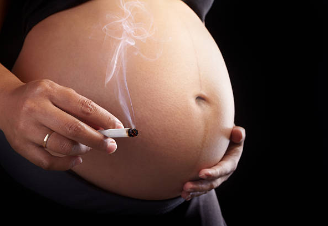
Smoking during pregnancy poses significant risks to both the expectant mother and the developing fetus. It is crucial for pregnant women to be well-informed about the adverse effects of tobacco and cigarette smoke on their health and the well-being of their unborn child.
What are the risks associated with smoking during pregnancy?
Effects of tobacco and cigarette smoke on the pregnant woman
Exposure to tobacco smoke during pregnancy can have detrimental effects on the mother’s health. It increases the risk of complications such as placental abruption, preterm birth, and low birth weight.
Risks of smoking during pregnancy for both the mother and the baby
Maternal smoking during pregnancy can lead to an increased likelihood of congenital abnormalities in the baby. It also elevates the risk of Sudden Infant Death Syndrome (SIDS) after birth.
Pregnancy complications linked to cigarette smoking
Cigarette smoking during pregnancy is associated with a higher incidence of miscarriage and stillbirth. It can also result in developmental issues and cognitive impairments in the child.
How does tobacco smoke affect the developing fetus?
Impact of environmental tobacco smoke on fetal development
Exposure to environmental tobacco smoke, whether from direct smoking or secondhand smoke, can interfere with the normal growth and development of the fetus. This can lead to long-term health consequences for the child.
Long-term effects of smoking during pregnancy on the child
Children born to mothers who smoke during pregnancy are at a higher risk of respiratory problems, behavioral issues, and learning disabilities. These effects can persist into adulthood.
Health issues that can arise from maternal smoking during pregnancy
Maternal smoking during pregnancy is linked to an increased likelihood of asthma, obesity, and cardiovascular issues in the offspring. It can have lasting implications on the child’s overall health.
What are the dangers of smoking during pregnancy for pregnant women?
Smoking cessation options for pregnant women
Pregnant women who smoke should seek support and explore smoking cessation programs to quit tobacco use during pregnancy. These programs can provide guidance and resources to help them overcome nicotine addiction.

Health risks associated with tobacco use during pregnancy
The use of tobacco products during pregnancy can lead to complications such as preeclampsia, intrauterine growth restriction, and increased neonatal mortality. It is crucial for pregnant women to prioritize their health and well-being.
How smoking during pregnancy can cause complications
Smoking during pregnancy heightens the risk of ectopic pregnancy, preterm labor, and birth defects in the baby. It can also impact fetal brain development and lead to long-lasting health issues.
Are there resources available to help pregnant women quit smoking?
Department of Health and Human Services’ initiatives for smoking cessation
The Department of Health and Human Services offers programs and initiatives to support pregnant women in their efforts to quit smoking. These resources focus on providing education, counseling, and access to nicotine replacement therapies.
Social support programs for pregnant women looking to stop smoking
There are various social support programs tailored to pregnant women who are seeking to quit smoking. These programs offer peer support, counseling, and motivational tools to assist women in their journey towards a smoke-free lifestyle.
Educational materials on the risks of substance use during pregnancy
Pregnant women can benefit from educational materials that inform them about the dangers of substance use, including tobacco use, during pregnancy. By understanding the risks involved, women can make informed decisions to protect their health and that of their baby.
What steps can pregnant women take to ensure a smoke-free environment?
Tips for women who smoke on how to quit tobacco use during pregnancy
Pregnant women who smoke can take proactive steps to quit, such as setting a quit date, seeking professional help, and avoiding triggers that prompt smoking. It is essential to stay committed to a smoke-free lifestyle for the well-being of both mother and child.
Creating a smoking cessation plan tailored to pregnant women
Developing a personalized smoking cessation plan that addresses individual needs and challenges is crucial for pregnant women. This plan can include behavioral strategies, support networks, and healthy coping mechanisms to overcome nicotine dependence.
Advice on how to avoid exposure to cigarette smoke while pregnant
Pregnant women should take precautions to minimize exposure to cigarette smoke by avoiding environments where smoking is permitted, asking family members to refrain from smoking indoors, and ensuring good ventilation in living spaces. Protecting the developing fetus from harmful smoke is paramount for a healthy pregnancy.
Q: What are the risks of smoking and tobacco use during pregnancy?
A: Smoking and using tobacco during pregnancy can cause a range of problems such as premature birth, low birth weight, and developmental issues for the baby.
Q: How prevalent is smoking among pregnant women?
A: Unfortunately, smoking among pregnant women remains a significant issue, with a concerning prevalence across different populations.
Q: How does smoking behavior change among pregnant women?
A: Many women who smoke during pregnancy may either reduce the number of cigarettes they smoke or attempt to quit altogether.
Q: What are the health effects of maternal cigarette smoking during pregnancy?
A: Maternal cigarette smoking during pregnancy can lead to complications such as respiratory problems, birth defects, and an increased risk of sudden infant death syndrome.
Q: Is it safe to use tobacco cessation products during pregnancy?
A: It is important to consult with a healthcare provider before using any tobacco cessation products during pregnancy to understand the potential risks and benefits.
Q: How can pregnant women quit smoking during pregnancy?
A: Pregnant women looking to quit smoking can explore options such as counseling, support groups, and nicotine replacement therapy under medical supervision.
Q: What are the effects of passive smoking on pregnancy?
A: Exposure to secondhand smoke during pregnancy can also pose risks to the baby, including increased likelihood of asthma and other respiratory complications.










